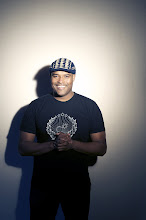In a time of so much flux, insecurity, and economic depression; I wonder how popular music and entertainment will shift to meet the times. I would like to use urban music to illustrate my ideas. In the late 60's and early 70's, during a time of tremendous political upheaval including the Vietnam War and the Civil Rights movement urban music, was and still is defined primarily by the black male superstars of the day. I make the black male stars distinction not to diminish or exclude the tremendous contribution of our female stars of then and now but to try and make the point that when outsiders analyze urban/ghetto culture it is usually defined by the actions of the male population of that community. I will continue this discussion within that framework. In the late 60's and 70's in America at any given time you could have had 8 to 10 black males, all from primarily impoverished urban communities. These communities suffered many of the same problems of crime, drug and alchohol abuse, single parenthood, and joblessness of poor urban communities of today but the difference of cultural expression of the urban males of then is strikingly different from the expressions of today. In the late 60's and early 70's on any giving week you may have had, Stevie Wonder, Marvin Gaye, Sly Stone, Bob Marley, Jimi Hendrix, Curtis Mayfield, and Al Green all topping the charts at the same time. If you go back and listen to the message of the music of these products of the urban environment you heard a clear message of redemption and over coming obstacles to become a better loving human being. Granted those times were the times of revolution and free love, it was the time of LSD and Marijuana. If you look at the beginnings of a latest musical genre invention from the urban community, hip hop; it started in the late 70's as an extension of the sentiments of the black men who where influential in the lives of the Black and Puerto Rican men who were fathers of the genre. When did it shift?
In my opinion the greatest shift in urban music after the 70's was the advent of crack cocaine's arrival in the urban community in the early 80's. Crack cocaine took historical urban issues and put them into hyper drive; at the same time crack created a hyper urban economy. So you had hyper violence, hyper materialism, hyper childhood neglect, hyper moral decline, and a hyper rich criminal youth. Not even heroin would take a mother from her child, but crack did. Crack caused urban blight unlike anything else in urban history, in my opinion. It was said that crack was first introduced in Oakland California around 1982; I don't remember crack hitting the east coast hard until around 85, 86. On the east coast, crack culture didn't start entering into the musical lexicon until around 87. The west coast had experienced it's affect for much longer and combined with gang culture it had seeped into the urban music dialogue faster than it did any wear else. I'm showing my age, but I remember when I was a senior in High School in 1988 and I first heard NWA "Fuck the Police," my friends and I couldn't believe it. The use of hyper violent imagery and the free use of the word nigger was completely startling and new to us. 1988 in NY was the year of Public Enemy's largest success and the introduction of the Jungle Brothers and later De La Soul and the Native Tongue movement, it was Big Daddy Kane and LL Cool J. It was Rob Bass. Later that year in the fall I started my freshman year of college at Morehouse in Atlanta and NWA and Too Short was blasting through the dorms from our West Coast peers. I also remember that first week a kid from Oakland jokingly called me a nigger; and I remember being almost provoked to violence. In New York at the time if someone called you a nigger that was a huge insult. 20 years later, things are a whole lot different. I find myself using that word all the time now, like a filthy habit that I love but need to break.
10 years ago we were experiencing the height of the benefits of post crack epidemic culture in full bloom with the most hyper violent, materialistic, and misogynistic musical content in urban music history. Now that the crack epidemic is long past and we could possibly be moving towards the end of a hyper gangster black male cultural aesthetic (noticing the skater and rock star aesthetic taking off in the urban community prompted by Lupe Fiasco, Pherrell Williams, and Kanye West and the arrival of Barack Obama as a cultural icon largely promoted in urban fashion), I wonder what the next movement to be created out of the urban community will be. We must acknowledge that we are running into some very interesting financial and political times. I wonder what the urban response will be. Here is an interesting documentary trailer that I found recently that I think brings up some interesting points.
Subscribe to:
Post Comments (Atom)

1 comment:
What?! No mention of The Roots?!?! Shawn Peters, I can't believe I found you on the Internet! Send me an email at my gmail address and let's get caught up. I'm on Facebook, too.
Mark Ross
USC Media Arts 4 LIFE
Post a Comment